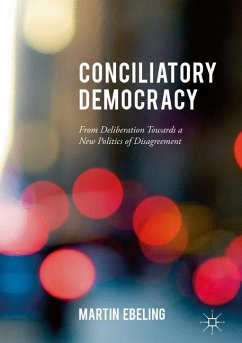In this book, Martin Ebeling discusses how we ought to react to our persistent political disagreement with other citizens. He presents this disagreement as not only a moral problem, but also as an epistemically unsettling phenomenon, as we often have reason to judge our opposition to be as competent as ourselves in judging the political issues at stake. Conciliatory Democracy reflects on the political philosophy of Jean-Jacques Rousseau and claims that advocates of deliberative democracy, which treats political disagreement mainly as a moral problem, should expand their approach. The author promotes Rousseau's appreciation of disagreement in contemporary political philosophy as a way to encourage conciliation within democracy. Ebeling furthermore draws on public choice theory and empirical research to reintroduce political parties as vital players in the institutional landscape of democracy.








